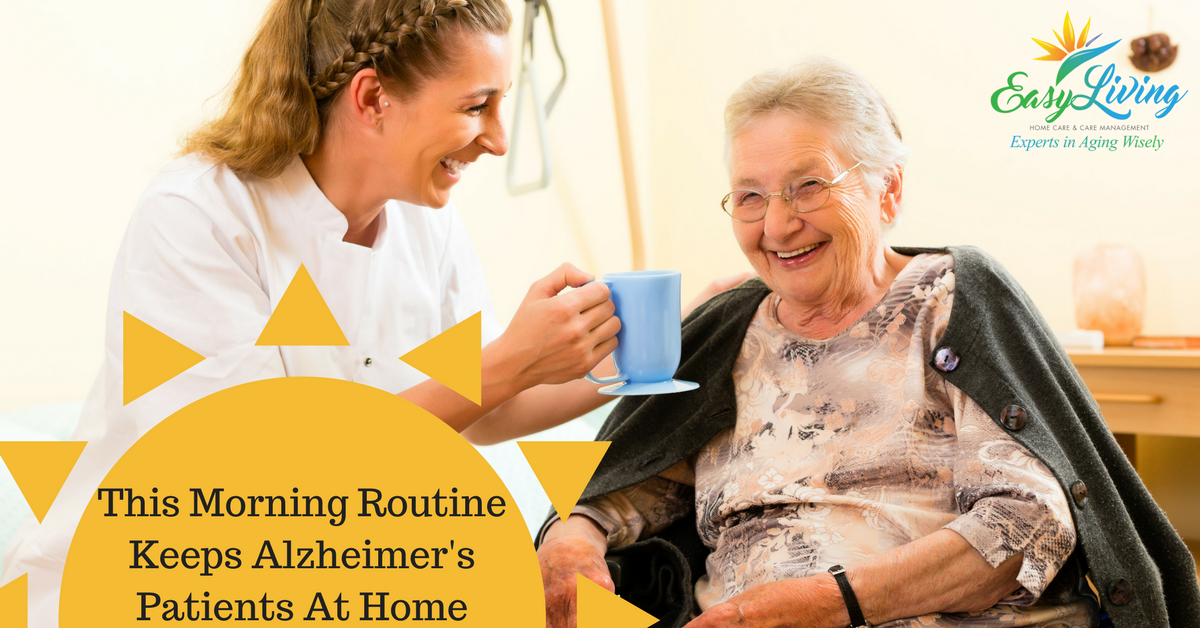Routine provides stability and comfort for Alzheimer’s patients. It also creates safety. Imagine the day-to-day world for an Alzheimer’s patient, where many things feel new and confusing. You might struggle to remember what happened a few minutes ago or wonder how to use common objects. Familiarity and stability provide some grounding in that confusing world. Additionally, “establishing a predictable pattern of events can help transfer the schedule of a daily routine into the long-term memory portion of the brain, helping a person retain their ability to perform activities of daily life”.
A morning routine can really help start the day off right for a person with Alzheimer’s. It establishes a healthy foundation. Our EasyLiving caregivers work with many Alzheimer’s patients, providing “AM care”. Giving the client a proper start to the day with some key services prevents unnecessary crises and deterioration.
Here’s an overview of what’s involved in a good morning routine and how it can help keep Alzheimer’s patients safe and healthy at home. If you’re an Alzheimer’s caregiver, establishing these aspects of a routine will help both you and your loved one. Individuals with Alzheimer’s often get tired or have behavioral difficulties in the afternoon, so take advantage of morning hours to get things accomplished. If you need support or live at a distance, our trained dementia specialists would love to develop and carry out a morning care plan for your loved one.
Waking Up on the Right Side of the Bed: Setting the Tone
Having a familiar presence and wake-up routine makes a happier start to the day. A caregiver can get to know the preferences (and irritations) of the individual to tailor this wake-up routine. Perhaps a calm “good morning” with a cup of water or coffee in bed helps the person get going. For others, they may immediately need help getting to the bathroom. The routine of getting up at the same time every day can also reduce sleep problems, irritability and possible even Sundowner’s symptoms.
Little touches like having the bed made up nicely after waking can improve the environment. Everyone is different in what makes them feel ready to “face the day”…brushing one’s hair and teeth, putting on a favorite robe, washing up, or getting dressed right away. Some of these housekeeping and personal care needs may become a struggle for the Alzheimer’s patient. So, imagine how having someone help continue those habits can improve mental health.
A caregiver also provides a reassuring presence. Rather than waking up confused, lonely and potentially afraid, the client wakes up to a smiling, familiar face. Social stimulation has a protective effect on the brain. Interaction and mental stimulation can improve quality of life, and even functioning.
Sunny Side Up: A Nutritious Start
Poor nutrition may lead to weight loss and an increase in behavioral symptoms. Unfortunately, Alzheimer’s patients have difficulty with the complexity of planning, shopping and preparing meals. And, nutrition needs become greater with age (and even more so with chronic or acute illness). So, a caregiver can make sure the morning routine includes a nutritious breakfast.
Most importantly, when a person lives at home, this meal can be made to their very specific tastes. It can also be served when they prefer. Some people are ready to eat upon waking. Others like to have a cup of coffee, get ready for the day or relax with TV or the newspaper first. Companionship can also improve eating habits so it’s great to start out the day sharing some conversation over a meal.
Additionally, a caregiver can spend some time in the morning preparing easy-access food for later. For example, we have many clients who don’t need round-the-clock care yet. They hire a caregiver for a few hours in the morning. The caregiver can complete all the tasks mentioned here, while also preparing a meal to reheat for lunch or dinner and checking/arranging for supplies.
Keeping Things in Order
During the morning routine, checking off a few “to do’s” can help keep the person on track and the household in order. As mentioned above, a caregiver can prepare some meals and snacks and check food/supplies. He or she can also straighten up and do some light housekeeping. A tidy home is a safe home. Tasks like laundry, basic housekeeping and personal care often go by the wayside as the person’s complex thinking deteriorates. But, rather than having to go to a facility, a simple morning routine can take care of so much.
Checking Up While Checking In
Medication errors lead to many unnecessary hospitalizations and deaths. Additionally, an estimated 3 million older adults in the U.S. are admitted to nursing homes due to medication problems. Medication assistance is another key part of a good morning routine. A caregiver can ensure the client gets his/her morning medications. They can also spot problems, such as signs the person is not taking medications properly or there’s been some change. In this way, the morning routine becomes crisis prevention.

